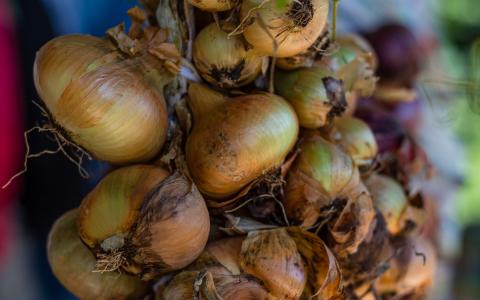Is it better to grow onions from seeds, sets or transplants?

Onions can be one of the easiest crops to grow. They have few major pest issues, don’t take up much room and can be grown anywhere in the garden where there is well-drained soil and full sun exposure. It’s not unusual for a home gardener to grow all of the onions they need for a year with relatively little effort. There are many different types of onions, but as long as you choose the right cultivar and starting method, you’re sure to have a good harvest by the end of the growing season.
Planting Choices: Seed, Sets or Transplants
Onions can be purchased in a few forms: seed, sets or transplants. Growing from seed is unquestionably the most economical way to grow onions. It’s also typically the only way to grow unique or unusual varieties. Seeds can be sown directly in the garden as soon as the soil can be worked in April or early May. Onion germination can be slow and patchy, leading many gardeners to start them indoors in the spring in order to ensure a full harvest.
Start onion seeds 10-15 weeks before you anticipate being able to transplant them into the garden, between mid-February and mid-March. When it’s time to plant in the garden, transplant the seedlings 3-4 inches apart. Onion seeds are only viable for about a year, so new seed should be purchased at the start of each growing season.
Another option is to plant onion sets. Onion sets are small onion bulbs - usually around a nickel in diameter - that were grown from seed in the previous season. They can be ordered from seed catalogues or picked up at garden centers and hardware stores in the spring. Onion sets are the easiest way to plant and ensure a harvest of full-sized onion bulbs. The only downsides are that they can be more expensive and variety is often very limited. You may only get to choose between yellow, red or white onions, not from the multitude of varieties that fall within each of those categories.
A third way to plant onions is to purchase transplants. Onion transplants were typically grown the previous growing season and are shipped in banded bundles in the early spring. They almost always have to be ordered in advance from seed companies. They might appear dry and pale on arrival because they are dormant but should grow perfectly well as long as they are planted right away.
Onions can be grown successfully from seed, sets or transplants. Deciding which method to use depends mainly on personal preference. Variety of choice has a much bigger impact on harvest than which propagation method is chosen.
Choosing Onion Varieties
Onion varieties can be divided into three distinct categories: long-day, short-day and intermediate-day type onions. Onion plants rely on daylength to determine when they will start to form bulbs. Long-day onions start forming bulbs when they receive 14-16 hours of sunlight each day. These varieties are best for New Hampshire gardens, where summer days are long.
Short-day onions are a good choice for the deep south because they only need 10-12 hours of light to initiate bulb formation. Though you can grow short-day onions in the Granite State, they’ll likely only produce small bulbs, because they will put on bulb growth when they are still small and only have a few leaves. Intermediate-day varieties start growing bulbs when daylength reaches 14-16 hours. These are also unlikely to form full size bulbs in northern gardens.
Within the daylength categories, onion varieties can be divided by the color of their skin, flavor and keeping quality, the latter being perhaps the most important. Fresh onions often have a sweeter and milder flavor and should be used relatively quickly as they don’t store very well. Classic examples include ‘Walla Walla Sweet’ and ‘Ailsa Craig Exhibition.’
Storage onions tend to have a stronger onion smell and taste, and they can hold up throughout the entire winter when stored properly. Bunching onions (also known as scallions and green onions) are another type of onion that does not form bulbs and should be eaten shortly after harvest. All of these types of onions can grow well in New Hampshire as long as you select long-day varieties.
Got questions? The Ask UNH Extension Infoline offers practical help finding answers for your home, yard, and garden questions. Call toll free at 1-877-398-4769, Monday to Friday, 9 a.m. to 2 p.m., or e-mail us at answers@unh.edu.
Do you love learning about stuff like this?
SUBSCRIBE TO Granite State Gardening newsletter
Got questions? The UNH Extension Yard and Garden Infoline offers practical help finding answers for your yard and garden questions.
Call toll free at 1-877-398-4769, Monday to Friday, 9 a.m. to 2 p.m., or fill out webform.
